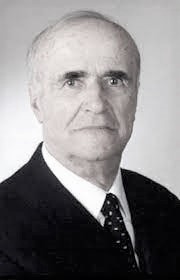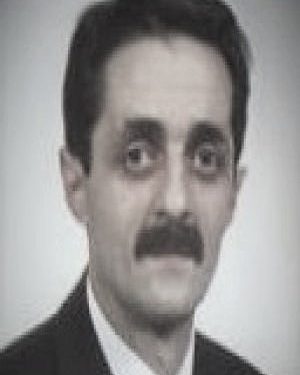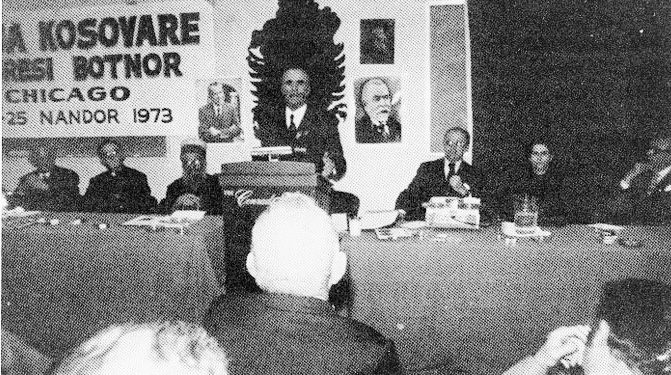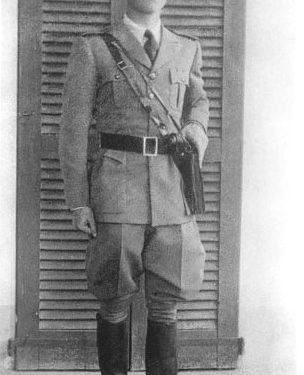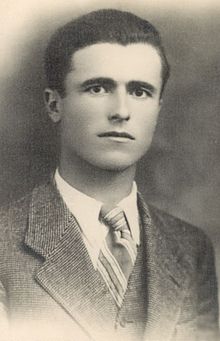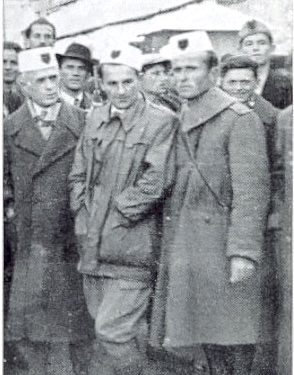By Eugen SHEHU
Memorie.al / Histories of nations are in themselves the stories of its prominent people. These stories remain immortal, almost eternal, being passed down from generation to generation, precisely because they are protected by the life, thought and work of their own distinguished men. In these stories, not only the great truths but also the great dramas and emotions, the wars and efforts, the cries of the underground and traces of lightning in the heavens are plasma. Such a dimension would accompany Abaz Ermenji’s 90s, until a few years ago, when he would close his eyes forever. His thought life and work will still remain sacred for all of us, as they were always offered to the Albanian future under the symbiosis of an organic union. A life lived only with great love for the nation, is worthy to be placed on the pedestals of honor of this nation.
Abaz Ermenji was born on December 24, 1913, in the small and remote village of the mother country, in Gërmenj, between the mountains and hills of Skrapar and Gramsh. Among those forests and legends of the Albanian kachaks, little Abazi would grow tall with the only dream of becoming a kachak, throw the rifle to his side and fight every foreigner’s foot in the Albanian ethnic villages. The parents made sure that their son went to school and he would take his first lessons at the school near the village in 1920. The Albanian sky was blazing with lightning. The Italian from Vlora had to be evicted. There were also hundreds of men from Skrapari, who grabbed their weapons and occupied the hills of Vlora.
Thus, while the Albanian thinkers tried in Paris and elsewhere, to fill the minds of the Great Powers of Europe that the Albanian borders cannot be further violated, the brave men in the mother country have grabbed their weapons. Together with the men of distant Ermenji, there was also the father of little Abazi. When he returned victorious from Vlora, he took Abazi and took him up to the famous Teqe of Kulmak, in that shelter of brave and true men, the Father of the Bektashian Teqe, seeing how the eyes of the 8-year-old boy from Ermenji shone, and took to him, asking; “What will you be when you grow up”? – “Kaçak”! – “But why don’t you become a teacher”? – “Because I want to liberate the Motherland”!
The men had not laughed. The men felt pain for Kosovo, Chameria and Albanian Macedonia, so it was good for them that this holy love was passed on from generation to generation. Abaz Ermenji had begged his father, that if he would go to Vlora again, he would take him with him. While years later, regarding this war, his wise pen would write: “After Italy’s cannon exploded, the Albanians attacked on June 5, fierce as a volley, and captured one by one the post commander and the positions the exterior of the Italians. But these were closed within the fortified lines, defending themselves by means of tools and heavy weaponry.
Their morale was shaken from the beginning, because the Albanians attacked suddenly and from all sides, with such courage that the Italians had not thought of. Heroic battles took place in Kotë, where the brave villagers, commanded by Ahmet Lepenica, jumped over the wire, wearing guns and entered the barracks inside. In that way, all the strong positions of the Italians, Gjormi, Llogaraja, Tepelena, Drashovica, were taken. In Tepelena, the war continued fiercely for five days, but with the forces that came from the surrounding provinces and several hundred men commanded by Ali Këlcya, the city of Ali Pasha was finally freed.
The Albanian military commission set up its headquarters in Drashovica. The Committee of “National Defense” once again asked General Piacentini for the surrender of Vlora. After he did not listen, it was decided to attack the city. At dawn on June 12, they flew like eagles on the banks of Babica, in the neck of Koçi, in the fortress of Kanina, and their victory was sealed in the olive groves of Vlora, with the blood of Salam Musaj” (Abaz Ermenji “The place occupied by Skënderbeu in the history of Albania” publication of the Committee “Free Albania” in exile, year 1968, page 377)
At the beginning of the 20s in the century that we left behind, Abaz Ermenji continued his studies in the gymnasium of the city of Shkodra, where for the sake of the truth, it must be said that the gymnasium in question was transformed into the heart of the Albanian national movement. The ideas that the Albanian teachers developed there, in order to pass them on to the new generations, try to articulate the awakening of a spirit of democracy and prosperity in the national consciousness.
The educational reforms led wisely by the then minister Mirash Ivanaj, aimed to educate the generations, first with the sacred love of the Albanian ethnic lands. Abaz Ermenji would be educated and nurtured precisely with this love, being convinced that only the union of the divided Albanian lands would be the future of our nation. At the same time Ermenji’s high results in the Shkodra high school. They forced the Albanian state of that time to grant the boy from distant Armenia a scholarship to continue his higher studies in France.
At the Sorbonne, Ermenji begins his studies at the Faculty of Literature. Studies would attract him immensely and he would soon win the admiration and sympathy of the French professors. But the more he marveled at the history of French letters, the more the national idea was transformed into a driving force within him. In 1933, he got to know by chance the outstanding patriot Mehdi Frashëri.
This, being an excellent expert in the field of international rights, was sent there, by King Zog himself, to participate in the debate with representatives of the Greek government, regarding the deportation of ethnic Albanians from Chameria to Anatolia. The Ermenji student, would learn from the mouth of Mehdi Frashër, not only the painful tragedy of the inhabitants of Çamëria, but also the glorious past of the Arvanites of yesterday, who had forgiven the independence of Greece, tens of thousands of Albanian hearts, while now they are trampling for shame.
In his memoirs, Mehdi Frashëri writes that; the only Albanian student, who was present in the talks and our harsh retorts with the Greeks, was Abaz Ermenji. Despite the fact that the protocol of the talks forbade the literature student to speak, I could see how his eyes lit up with anger and hatred. After completing his studies at the Sorbonne, Abaz Ermenji received the title “Academic license as lettres” and was sent to the French Lyceum of Korça to teach. The Albanian students of this high school remember well the strict teacher of French literature, who knew quite well and spoke fluently about literature and especially the history of Albania. But these students will never forget their professor, Ermenj, in the demonstration organized in Korça, on December 28, 1939, who with the national flag in hands, printed to his students singing the famous verses of the song “For the Motherland”!
This was the reason that only four days after this demonstration, the Italian occupation authorities arrested Abaz Ermenji and together with Safet Butka, Stavro Skëndi, Llazar Fundon, Selman Riza, Fazlli Frashëri, etc., sent them to Bari prison. A few months later, seeing them as a disturbing element of the established regime, the Italian courts exile these men to the infamous island of Ventotene. But the suffering there could not weaken the indomitable spirit of the great nationalist.
From Ventotene, Ermenji closely follows the troubled events in Europe and foresees in all these disturbances the possible movements of the Albanians towards their freedom and prosperity.
In the fall of 1941, it was Mustafa Kruja who forced the Italian side to take to Albania dozens of honest nationalists who had filled the Italian prisons. Abaz Ermenji first goes to see his parents and two weeks later, in November 1941, he meets Skënder Muço, Hysni Lepenica and Safet Butka.
Between these prominent men of Southern Albania, trust is established to organize the people and to launch concrete combat actions against the Italian invaders. In the spring of 1942, Ermenji was called to Tirana, by the leader of the Albanian nationalists, Mid’hat Frashëri, and together with Skënder Muço and Zef Palin, determined definitively the military and political actions, according to the ‘Dekalog’ of the ‘Balli Kombëtar’ .
This “Decalog” will remain for the patriot from Ermenji, the eternal “Bible”, until the last moments. One of the points of this “Decalog”, foresaw the liberation of ethnic Albanian lands from foreign rule and self-determination according to the principles of the Geneva Charter. At this point, his prophecy was being fulfilled, when at the age of 7 he told the father of Teqe Kulmaku, that; “I will liberate Kosovo”!
Abaz Ermenji, a 30-year-old doctorate at the Sorbonne in the field of letters, passionate about Albanian literature and history, will now ride through the South of Albania and together with Muharrem Kapllani, Tefik Cfiri, Maliq Dushar, Pasho Kolaneci and Nezir Muzhaq, in in the winter of 1942-1943, they will undertake a series of battles against the Italian forces. The rifle of the nationalists of South Albania, would fire for the sacred freedom, in; Vlorë, Mallakastër, Tepelën, Përmet, Skrapar, Kolonje and Starovë.
The former professor of the high school of Korça, was now placed in the first ranks of these combat formations. The homeland was defended with rifles and feathers. The brave makes both, the rifle and the feather. A series of Italian documents tell us about the fierce battles of their forces with the nationalist ones, commanded by Armenians, especially in 1943. These battles would remain excellent examples of historicism in the history of our nation’s wars. Oriented towards a Western civilization, Abaz Ermenji would do his best to stop the useless bloodshed between Albanians, especially between nationalists and communists.
He would know how to forgive whenever, when it came to the realization of the long-standing dream of Ethnic Albania. About this tragedy, he would later say: “Balli Kombëtar had shared the presidency of Mid’hat Frashëri, a proven leader who represented the true nationalist tradition and the right aspirations of the Albanian nation. The National Front tried to tell the people how the truth stood, how its problems and opportunities were presented and how the future of Albania was foreseen.
And the communist party told him fantastic dreams, children’s fairy tales, and lied in the most shameless way, calling the white “black” and the black “white”. The National Front, which tried to protect the farmer’s hut and spare the Albanian blood, that’s why it hit the enemy in places where the house and the civilian population could not be damaged, was always in opposition to the tactics of the communists, who called ” war”, several rifles that were fired at the fascist forces in the populated centers, in order for the enemy to take revenge, burning and mass murdering the people around, so that the number of “proletarians”, fugitives, could increase that would increase the communist ranks.
Another problem facing the National Front, in irreconcilable opposition with the Communist Party, was the issue of Ethnic Albania. It is known that Kosovo and Chameria had been separated from the Yugoslav and Greek elections by the Axis powers, and that their union with Albania could not be called a settled matter. The National Front was the first to understand that work, and did not connect the liberation of these provinces with the circumstance of a temporary victory of Nazi Germany, but with the right of the peoples to self-determination, which was held as the fundamental principle of the Charter of Atlantic, announced by Roosevelt and Churchill, on August 14, 1941.
In order for the population of Kosovo and Chameria to be able to claim and defend that right, they had to be organized and helped by their brothers from political Albania.Through this path, Balli Kombëtar understood the liberation of those provinces, and this was the fight that he wanted to do for Ethnic Albania”. (Abaz Ermenji “The place occupied by Skënderbeu in the History of Albania”, publication of the Committee “Free Albania” in exile, year 1968, pages 463-164).
The capitulation of the Italian army, in September 1943, seemed to change the fortunes of the Albanians, bound by continuous wars. But in the Albanian horizons, the German armies appeared, which, although in the strategic goals, did not include the invasion of the Albanian mother state, however, they could not but have consequences in the Balkan and European disturbances. Precisely, in that powerful sequence of events, the patriotic dimension of Abaz Ermenji, who would always lean towards Albanianism, would appear.
At the moment when the communist clique of Tirana, led by Miladin Popovici and Dushan Mugosha, ordered to open a powerful fire against the Albanian nationalists, who were looking for Kosovo, Abaz Ermenji, maintaining his own formations, avoided this war as much as possible. Under the direct and great influence of Mid’hat Frashër, the outstanding patriot from Ermenji, he could stop the flame of the fratricidal war in Albania, as much as he could to convey to the ranks of the nationalist fighters, the great message that Albania is of Albanians and not of Serbo-Slavic Orthodox, or Greeks.
And when the war against the Germans was involving many parts of Albania, giving Europe a reminder that pure Albanian nationalism had nothing in common with Hitler’s National Socialism, Abaz Ermenji undertook a series of actions against the German forces, especially in Albania Middle. Despite the fact that the ideologized Albanian historiography has deliberately left this fact in oblivion, this does not presuppose at any moment the infamous slogan according to which;”Ermenji has collaborated with the enemy”!
I would like to bring to the readers, just a short passage of Julian Amery’s book, of this British missionary who lived in Albania in 1943-1944. Among other things, the author writes: “With a reforming spirit, Abaz Ermenji found some salvation in the war, against communism, and precisely because of the fact that the National Front offered such an alternative, Ermenji spared neither himself nor his people.
Mid’hati and Abbas Ermenji had come as political and military delegates of the National Front to officially inform us that their entire Central Committee was now on the mountain and that they had decided to start operations against the Germans, as early as the next day. Abaz Ermenji was preparing to start the battle in an ambush on the Tirana-Shkodër road, so he asked to be given a British officer, to see the position of his men and to confirm the results of the action.
We immediately accepted his request and Mereti was chosen as our liaison officer, next to the forces of the National Front. The next day, Abaz Ermenji ambushed as he had planned and, with a force of two hundred men, suddenly attacked a German convoy, consisting of forty trucks. Mereti then informed us that three trucks were burned, eighteen were looted and damaged, eight motorcycles were destroyed and more than thirty Germans were killed.”(Julian Amery “Sons of Shqipe”, Publishing House “Lumo Skëndo” Tirana 2002, page 329-330)
In November 1944, when the power of the Russian Orthodox Bolsheviks was established in Albania, Abaz Ermenji would announce before the leaders of Albanian nationalism, his credo: “We will not let go of the gun, whoever wants to follow”! From that moment until 1946, two years in a row, in close cooperation with the Kazazi brothers, Abaz Ermenji would join the Albanian anti-communist movement, transforming into an interpreter of the highest aspirations of his people, for freedom and democracy.
The battles in Bajzë and Koplik, in Postribë and Shalë, Orosh and Peshkopi, in Çerem and Golaj, would be bravely led by Abaz Ermenji, declared a “war criminal” by the communist regime of Tirana. The paradox lies in the fact that he was declared a “collaborator of the Italians and Germans” precisely that nationalist, who had received French academic titles, fighting with weapons in hand, for years, against the Italians and Germans.
In the fall of 1946, when the wards of the People’s Protection Division were burning the houses of Skrapar in Kolonje (since Abaz Ermenji had taken refuge there), the great nationalist decided to flee to Greece. From 1946-1949, Ermenji would suffer in the infamous camps of Greece, even his life would be put in danger, by the Greek communists. It was certainly the intervention of the Anglo-Americans, in which case Abaz Ermenji was sent to Italy, especially to be put in charge of the Albanian anti-communist forces in exile.
There it again gains its own human dimension, to surround everyone in the anti-communist front, regardless of what party they represented, or what ideas we expressed. Albanian ethnic signs would always serve the patriot from Armenia, just like star constellations, which told the way to brave sailors in ancient times. Even in 1954, when Abaz Ermenji was put in charge of the “Free Albania” Committee in Paris, the vision for Ethnic Albania would remain unchanged for him.
In many meetings, conferences, conversations with prominent Western politicians, Ermenji would convey the idea that an ethnic Albania is a factor of stability in the Balkans or, on the contrary, a fragmented Albania would reflect a troubled Balkan underworld, for whole decades. Invited by peace organizations in Europe and the USA, Professor Abaz Ermenji would contribute by confessing that communism, this hateful disease for Albanians, had nothing in common with the spiritual continuity of their compatriots, on the contrary, it was installed there through rivers of blood spilled between one mother’s brothers. He would receive in New York, the “Eisenhauer” decoration given by the US President for the continuous struggle and efforts against communism. But the energies of this nationalist could not find peace even after these honors, the only ones given to an Albanian.
In the assembly on the occasion of the Albanian League of Prizren, in New York, among others, Professor Ermenji would say: “We must establish a complete Albanian state, to be a factor of progress and peace alongside the other peoples of the Balkans. In political Albania and abroad, today we have nearly five million Albanians, who have a much more developed national consciousness than they had at the time of the League of Prizren. They look at it with poison in their hearts that Prizren and Skopje, the centers of Albania at that time, are not part of today’s political Albania. These Albanians will never let go of their weapons, until all the sons of the nation gather under a common homeland.
With all the brutal means that our enemies used, our light will never be extinguished because, the soul of a nation is not extinguished. We have raised with all the suffering and efforts, therefore our will, no force can break it. We will fight unyieldingly, until we have breath, and those who come after us will continue to fight unyieldingly. Our light and our weapons will go hand in hand, the people will fight from generation to generation, until the principles set by the League of Prizren become a reality, until the entire Albanian nation, the oldest nation in the Balkans, unites in one full state, in a free state, to direct his own life and become the master of his own destinies”. (Taken from the speech on the occasion of the 100th anniversary of the League of Prizren”, New York, June 24, 1978).
From the end of the 80s, of the century we left behind, when I met Professor Abaz Ermenji for the first time in Paris, I was surprised not only by his political clarity, but especially by his great energy and courage to go until the end of the dream of his youth, the unification of the Albanian lands. In the new European developments, the great nationalist envisioned not only the overthrow of communism, as a rotten economic system, but also a spirit of freedom and democracy, which meant the presentation of the ideas of Ethnic Albania.
Also at the beginning of the 90s, Abaz Ermenji would be put in charge of major tasks, for the re-creation of the “Balli Kombëtar” Party, both in the mother country and in Europe and beyond. The last great nationalist who, seeing Albania free from the barbed wire of communism, during these years tried with flesh and soul, not only to evoke the glorious past of Albanian nationalism, but also to prove that the ideas of great leaders of the National Front, have been and remain visionary, until these years of the new century.
Those ideas survived and are still passed on today, as they are the hope of all Albanians, wherever they live in every corner of the globe. At the peak of Serbian murders and rapes, in March 1999, Abaz Ermenji, chairman of the “Balli Kombëtar” Party, would address his compatriots through his electronic address: “Calling all Albanians! As we predicted, the Serbs are exterminating the people of Kosovo, killing men and throwing women, old people and children out of the borders, in the most barbaric conditions imaginable, up to now more than 1,000,000 people have been displaced from their homes. Who lived in those places since the time of the Illyrians? They took everything they had, burned their houses, villages and towns, and threw them into the streets, without allowing them to take even a piece of bread with them.
Of these, after spending days and nights in snowy forests, more than 200,000 have come to Albania. Others have entered Macedonia and Montenegro, where they are removing all the blacks. Others are still hiding in the forests of Kosovo, without food or clothing. I am proud that the Albanian state is doing everything possible to help these poor people, taking them to their families and sharing a morsel of bread with them. This is an awakening of national feeling, a passionate love for Albania. But we must do more than that. We must make all our efforts; we must give all our help, for the liberation of Kosovo and the return of these miserable brothers to their country. We must liberate Kosovo, or we must all die.
A calamity as serious as this has rarely hit the Albanian nation. We must face it with the courage of men. It is likely that the NATO forces will land on the land of Kosovo. But for now, we must give all our help to the Kosovo Liberation Army. I call on all those Kosovars who are members of the National Front to join the KLA. It is time, today or never, to sacrifice everything for Albania and for the salvation of the Albanian nation. For the liberation of Kosovo, the “autonomy” of the Kosovars will no longer have any meaning, because they cannot live in a framework with Serbia, which is trying to exterminate them.
Kosovo will become independent. We must all fight and work in this direction. We must keep the exiled people of Kosovo united, so that they can return to their homes after the Kosovar land is liberated, we must not accept any division of that land, which has always belonged to the Albanians. Try, men and women, to achieve this high national goal. Because only then, we will have fulfilled our sacred duties and have a clear conscience. Abaz Ermenji” (“Balli i Kombit” Newspaper, Tirana, March 11, 1999)
At the same time, although age was taking a toll on him, Abaz Ermenji would unreservedly support the struggle of the ethnic Albanians in Macedonia, in defense of their elementary and state-forming rights. The Albanians in Kumanovo, Skopje, Tetovo, Gostivarë, Kîçovo, Ohrid and Struga will always be grateful to the great nationalist Abaz Ermenji. They, like all Albanians, will know how to appreciate the work of their legendary commander, the far-sighted political leader, the invincible fighter for the Albanian cause.
His muse, as against the muse of ancient Orpheus, already enlivens the troubled souls of Albanians everywhere. Therefore, all the Albanian nationalists, from The Hague, of the last century to the present generation, will know how to separate his physical life from the eternal one of the warrior, Abaz Ermenjit. I had the honor and privilege to be under your directives, under your teachings, under your instructions, and not only me personally, but also all the recovered members of the National Front. Your bequests, that; “The pen and the gun become twins, when Freedom wants it”, remain engraved in the memory of all “Servants of Albania”. Memorie.al




